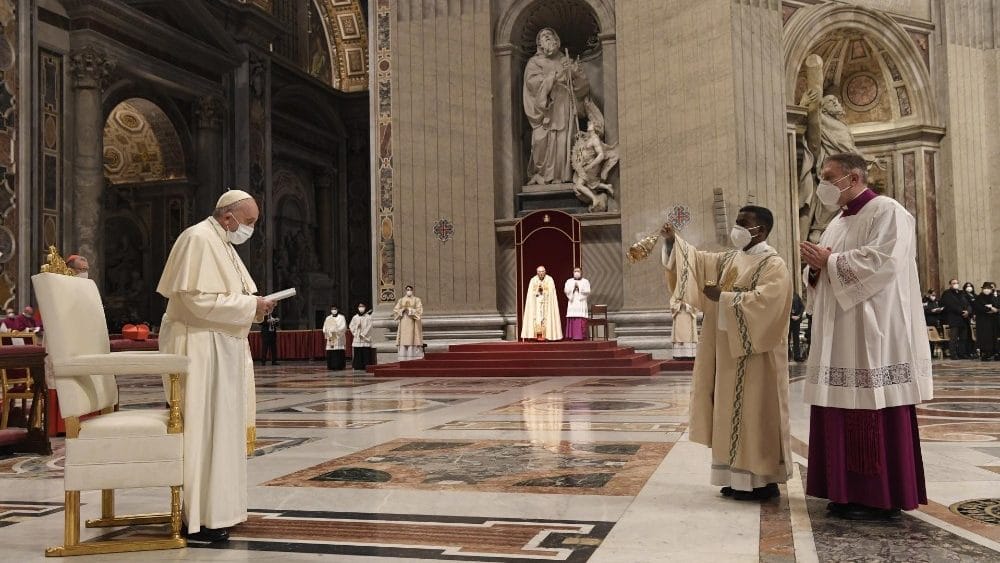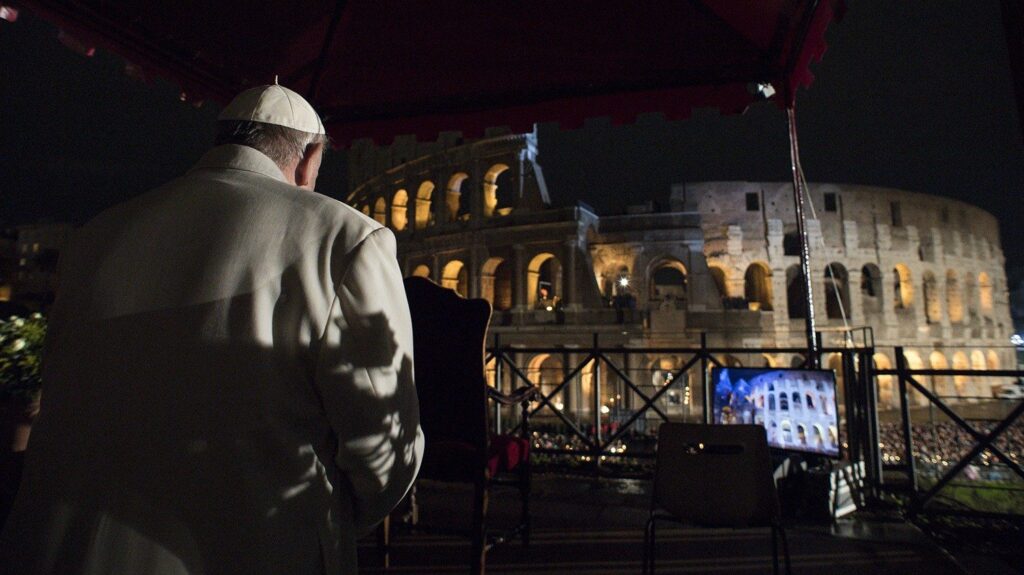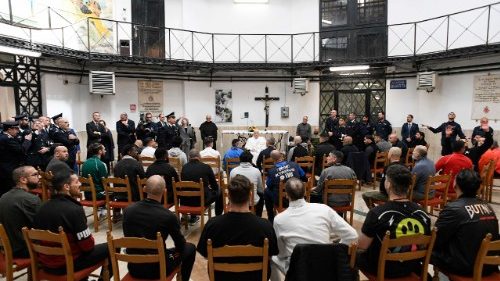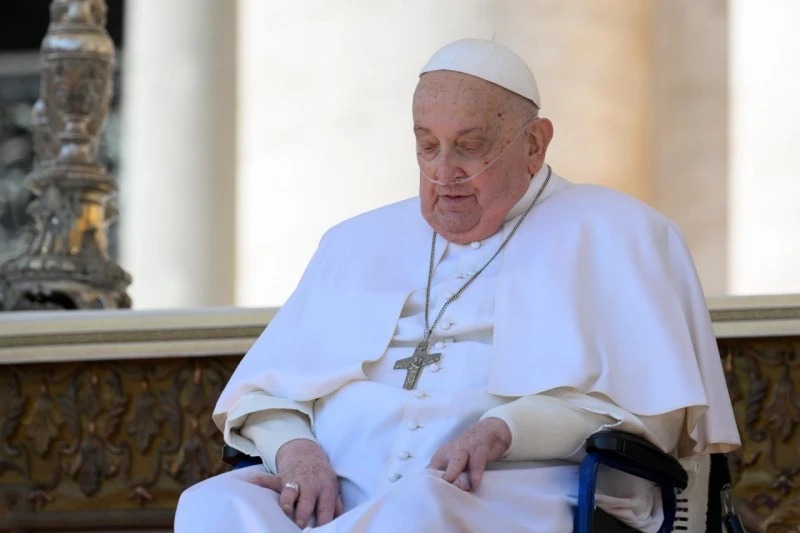Christmas Reawakens Amazement, Wonder, Contemplation
Pope's Homily at Vespers of the Feast of Saint Mary, Most Holy Mother of God, and Te Deum of Thanksgiving at End of Year

Christmas reawakens amazement, wonder, and contemplation, Pope Francis said today in his homily at Vespers of the Feast of Saint Mary, Most Holy Mother of God, and Te Deum of Thanksgiving at year’s end.
“During these days, the Liturgy invites us to reawaken our amazement at the mystery of the Incarnation,” the Holy Father said in St. Peter’s Basilica. “The feast of Christmas is, perhaps, the liturgy that evokes this interior movement to a greater degree: amazement, wonder, contemplation – just like the shepherds of Bethlehem, who first received the luminous angelic tidings and then set out in haste and actually found the sign that had been given them: the Babe wrapped in swaddling clothes in a manger. With tears in their eyes, they knelt before the newborn Saviour. They were not the only ones – Mary and Joseph are also filled with holy wonder at what the shepherds said they had heard from the angel about the Child.”
While proclaiming the “amazement” that comes with Christmas, the Holy Father warned of the negative impacts of the pandemic. He urged the faithful to remember the “solidarity” that God provides during a time of great challenge.
“A sense of being lost has grown in the world during this time of the pandemic,” the Pope lamented. “After the initial reaction phase in which we felt in solidarity in the same boat, the ‘every man for himself’ temptation spread. But thank God we reacted again with a sense of responsibility.
“We truly can and must say ‘Thank You, God’, because the choice to be responsible in solidarity does not come from the world: it comes from God – rather, it comes from Jesus Christ who has once and for all impressed on our history the ‘route’ of our original calling: to be brothers and sisters all, children of the same Father.”
Following is the Holy Father’s homily, provided by the Vatican:
During these days, the Liturgy invites us to reawaken our amazement at the mystery of the Incarnation. The feast of Christmas is, perhaps, the liturgy that evokes this interior movement to a greater degree: amazement, wonder, contemplation – just like the shepherds of Bethlehem, who first received the luminous angelic tidings and then set out in haste and actually found the sign that had been given them: the Babe wrapped in swaddling clothes in a manger. With tears in their eyes, they knelt before the newborn Saviour. They were not the only ones – Mary and Joseph are also filled with holy wonder at what the shepherds said they had heard from the angel about the Child.
This is the way it is: Christmas cannot be celebrated without being amazed – but an amazement that is not limited to superficial sentiment, connected with the externals of the feast, or worse yet, with the frenzy of consumerism. If Christmas is reduced to this, nothing changes: tomorrow will be just like yesterday, next year will be like last year, and so on. That is like warming ourselves for a few seconds by a straw fire rather than exposing our entire beings to the power of Event, not grasping the heart of the mystery of Christ’s birth.
This is the heart: “The Word became flesh and dwelt among us” (Jn 1:14). We hear this repeated several times in this evening’s liturgy that begins the Solemnity of Mary, the Holy Mother of God. She is the first witness, the first and the greatest, and at the same time, the humblest – the greatest because she is the humblest. Her heart is filled with amazement without the shadow of romanticism, of sweeteners, of spiritualization. No. The Mother brings us back to reality, to the truth of Christmas contained in the few words Saint Paul uses: “born of a woman” (Gal 4:4). Christian amazement is not the result of special effects, of fantasy worlds, but from the mystery of reality: there is nothing more amazing and stupefying than reality! A flower, a clod of earth, a life story, an encounter, the wrinkled face of an elderly person, or the blooming face of a newborn baby, a mamma who nurses a baby in her arms. The mystery shines there.
Brothers and sisters, Mary’s amazement, the Church’s amazement, is filled with gratitude. The gratitude of the Mother who, contemplating the Son, feels God’s nearness, feels that God has not abandoned his people, that he has come, is near, is God-with-us. Problems do not vanish, difficulties and worries are not lacking, but we are not alone: the Father “sent forth his Son” (Gal 4:4) to redeem us from the slavery of sin and to restore our dignity as children. He, the Only-Begotten, became the firstborn among many brothers to lead all of us, lost and dispersed, back to the Father’s house.
A sense of being lost has grown in the world during this time of the pandemic. After the initial reaction phase in which we felt in solidarity in the same boat, the “every man for himself” temptation spread. But thank God we reacted again with a sense of responsibility. We truly can and must say “Thank You, God”, because the choice to be responsible in solidarity does not come from the world: it comes from God – rather, it comes from Jesus Christ who has once and for all impressed on our history the “route” of our original calling: to be brothers and sisters all, children of the same Father.
Rome carries this calling written in its heart. Everyone feels like a part of the family in Rome; in a certain sense, everyone feels at home because this city preserves a universal openness within it. It comes from its history, from its culture. It comes primarily from the Gospel of Christ that laid down deep roots here, made fruitful by the blood of the martyrs.
But let us be careful even in this case: a welcoming and fraternal city is not recognized as such by a “façade”, by beautiful discourses, by bombastic events. No. It is recognized by the daily, weekday attentions paid to those who struggle the most, to those families who feel the weight of the crisis most, to those persons with serious disabilities and their families, to all those who need to use public transportation to go to work, to all who live on the outskirts, to those who have been overwhelmed by some failure in life and need social services, and so forth.
Rome is a wonderful city, that never ceases to enchant. But for those who live here, it is also a difficult city, unfortunately not always dignified for those who live here or its visitors, a city that sometimes rejects. The hope, then, is that everyone who lives and works here, or are pilgrims or tourists, that everyone might appreciate Rome more and more for its welcoming care for the dignity of life, for our common home, for the weakest and most vulnerable. May everyone be amazed, discovering a beauty in this city that is, I would say, “consistent”, and that evokes gratitude.
Sisters and brothers, today, the Mother – Mother Mary and Mother Church – shows us the Baby. She smiles at us and says: “He is the Way. Follow him, trust”. Let us follow him on our daily journey: he brings time to its fullness, He gives meaning to what we do and to the days we live. Let us trust in joyful times and in sorrowful times: the hope He gives us is a hope that never disappoints.
© Libreria Editrice Vatican
Related

Stations of the Cross 2025: Pope Francis leads Good Friday prayer with his own meditations
Exaudi Staff
18 April, 2025
32 min

Pope Francis brings hope to prisoners: visit to Regina Caeli on Holy Thursday
Exaudi Staff
18 April, 2025
1 min

“Priests as Bearers of Hope”: Pope Francis’ Call at the Chrism Mass
Exaudi Staff
17 April, 2025
1 min

Pope Francis’ Catechesis: God always comes to find us!
Exaudi Staff
17 April, 2025
5 min
 (EN)
(EN)
 (ES)
(ES)
 (IT)
(IT)

